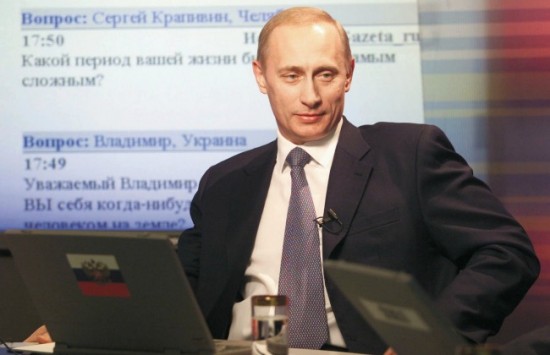Further strictening of Russian internet law passed the legislature Monday, and is expected to further cool Russian internet expression, while Russian President Vladimir Putin explained the law in terms of “the way its done everywhere” to deal with the CIA-initiated internet, and thanked Edward Snowden for playing his part.
Under the law, commonly refereed to as the “bloggers law” because the owner of any website–referred to as a “blog” in the language of the bill–with a daily following of 3,000 or more, including social media followers such as those on Twitter and Facebook, will be forced to register a real identity and address with the government, and will be responsible for any content posted on the site, including its accuracy. Henceforward, no internet user with a basic amount of social media clout will be anonymous legally in Russia, and will be held to the same standards as mass media outlets, but without the protections granted regular media. The law is expected to have a cooling effect on expression on the internet in Russia.
Recently, two of Russia’s largest blogging services, Yandex and LiveJournal–announced that publicly visible counters would stop below the 3000 number.
The law also requires all online platforms–search engines and social networks–to maintain records of everything posted online for the previous six months. The records must be kept inside Russia. In is not clear in the law whether this provision covers Google, Twitter, Facebook, and other international social media.
The new internet regulations will take force August 1.
The legislature also ruled Monday that as of July 1, common swearing will no longer be allowed in movies, television, theater or music. The four words that were banned are those crudely denoting male and female genitalia, sex and prostitutes.
Russian President Vladimir Putin expressed his views of the internet a few weeks ago on a live national TV broadcast, saying, “You know that it all began initially, when the Internet first appeared, as a special C.I.A. project.” “Special services are still at the center of things,” Putin continued, and thanked American fugitive exile in Russia, whistleblower Edward Snowden, for showing the world the efficiency of NSA data collection.
Putin explained the new law, saying that anyone affecting thousands or more people with their opinions should be considered a media outlet, and said that this was “the way it is done all over the world.”
Comparing the new internet laws to the Chinese model, one prominent critic said, “It is part of the general campaign to shut down the Internet in Russia. They have not been able to control it until now, and they think they should implement the Chinese model. But they don’t understand how it works. The Chinese model also stimulates the development of local platforms, while the Russian laws are killing the local platform.”
China employs a policy of tightening censorship of the internet, and has banned all Western social media, including Google, Facebook, YouTube and twitter.
By Day Blakely Donaldson
Sources:
